For many organisations, the people they employ are the most valuable assets they possess, but some are still on the starting blocks when it comes to understanding the full importance of investing in developing their employees.
People development is not just about training and in the current economic and politically uncertain climate, training may not provide the best return on investment and deliver the desired. A coaching approach, however, can offer business leaders and managers of all levels the sustainable opportunity to build a highly skilled and motivated workforce who are ready to face the challenges and opportunities the future brings.
Embedding coaching into your company’s philosophy can help improve performance from top to bottom and bottom to top, set goals, and deliver long-term benefits for the employees, the business and customers.
If you work with people but aren’t using coaching skills in your management style or team development, you could be putting a cap on your, your colleagues’ and employer’s potential.
A strategic impact for HR professionals
At the heart of every organisation lies its working culture and for coaching to be truly effective, it must be entrenched in your people management strategy. Modern and progressive workplaces need a coaching mindset to cultivate growth, innovation and value creation and HR practitioners can lead the way when it comes to transitioning to a coaching culture.
HR professionals who can leverage their own skills as internal coaches will play a central part in helping line managers, senior executives and team leaders to develop coaching skills themselves. Bolstering the effectiveness of your talent management efforts, coaching skills and conversations should be applied company-wide to enable employees at all levels to grow and meet the organisation’s evolving needs.
Becoming a better manager
Famously, back in 2008, Google ran an internal review called Project Oxygen to establish what makes a great manager at Google. The tech giant was keen to determine what the most important qualities were that these managers possessed so they could be incorporated into its manager development programmes.
Being a good coach came out top.
And as Google has continued to review and finesse the project’s findings, ten years on coaching skills is still number one on its list of behaviours. What’s more is that the nine attributes it identified such as empowering the team/not micromanaging, creating an inclusive environment, being results-orientated, having good communication skills, supporting career development, having a clear vision and being able to collaborate are all underpinned by using a coaching approach.
While old management styles die out, more needs to be done with Harmonic’s 2018 Future of Global Work survey, finding that one of the most significant people challenges facing organisations right now is that managers lack coaching skills.
Positive work cultures are built upon staff members being coached, not managed. Coaching works and pays huge dividends such as increased satisfaction and improved performance. There’s a healthier turnover to be enjoyed from a rise in productivity too.
Thinking about a career leap?
Coaches come from all walks of life and many have made the full-time career switch because they are driven by the desire to so something more meaningful.
Coaching is naturally a good fit for anyone who has had a background in HR, learning and development, consultancy, training or who has led a team in a corporate environment but retraining or upskilling to become an independent executive coach takes time, investment and dedication.
Aspiring coaches can choose a number of different pathways when starting their professional journey, but expectations are high when it comes to working with organisational clients. Credentialing with one of the industry’s professional bodies is a must if you want to demonstrate commitment and best practice to potential customers.
Practitioner Diploma in
Executive Coaching
10 March – 17 June 2020, Edinburgh
Enabling you to become a qualified coach or to develop the deepened skills to better manage others, this triple-accredited programme explores coaching’s key principles, develops your style and equips you with all the necessary skills to get started.
www.aoecscotland.com






